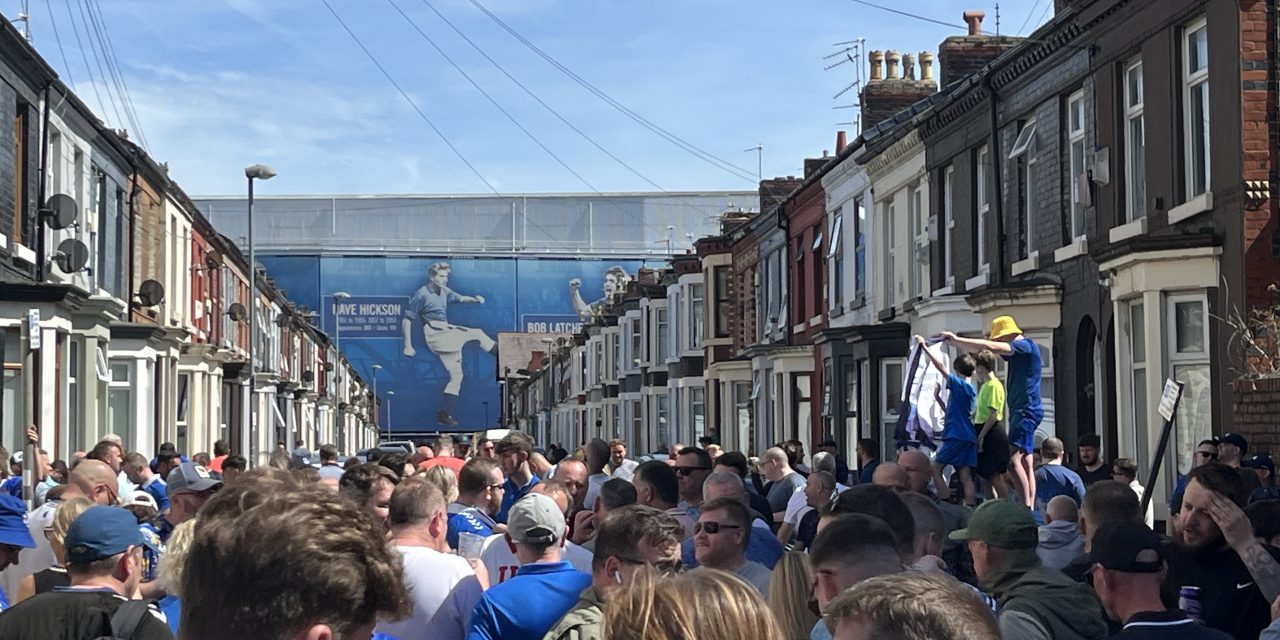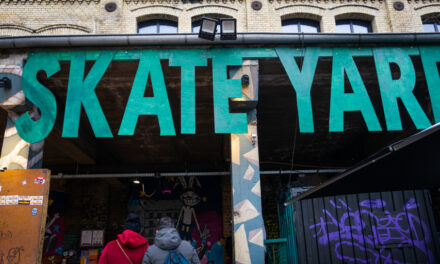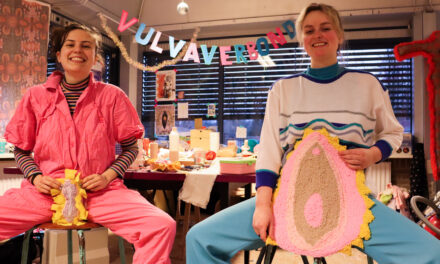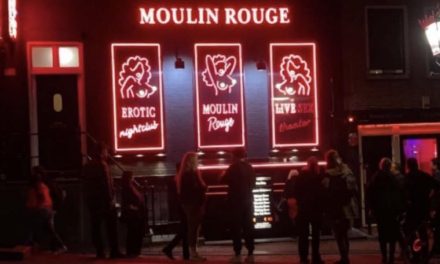This year marks the 130 year birthday of the ‘Friendly Derby’, a match between Liverpool FC and Everton FC. In a city with two major clubs, how do you choose between them? And what makes Liverpool such a special football loving place? Looking for answers in the city of Liverpool.
‘Our former manager put it perfectly. Everton is the people’s club.’ Everton fan Jane, 66 years old, wearing a blue sweater with an Everton FC pin on her chest, is on her way to the Everton stadium Goodison Park. The stadium is situated right in the middle of a residential area, on both sides of the street, small houses are located. When you look at the end of the street, Goodison Park emerges.
Jane takes a picture with her daughter and granddaughter with Goodison Park in the background. ‘I have been coming here since I was a little girl. My father supported Arsenal but my uncle was an Everton fan, a real Toffee*, and he took me to my first game. I’ve been a fan ever since and now my daughter and granddaughter are too. That’s why they call it the peoples club, everyone is welcome and feels at home here. Once we are in the stands, we’re all friends.’
-
Young Everton fans holding a banner
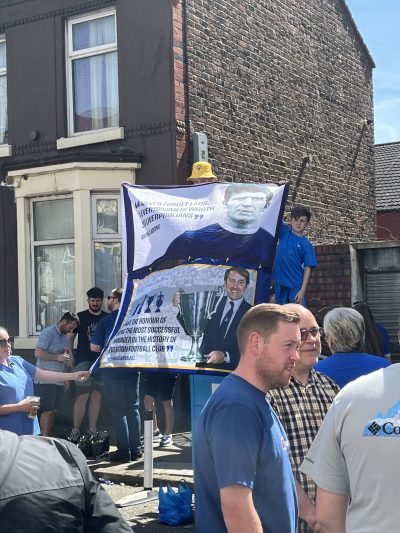
-
Everton fans walking towards Goodison Park
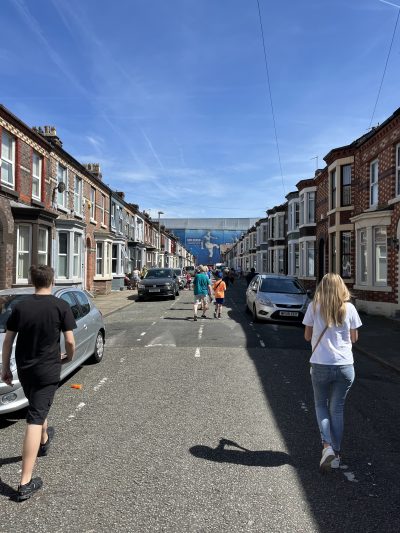
-
Statue of the Holy Trinity of Everton: Howard Kendall, Alan Ball and Colin Harvey
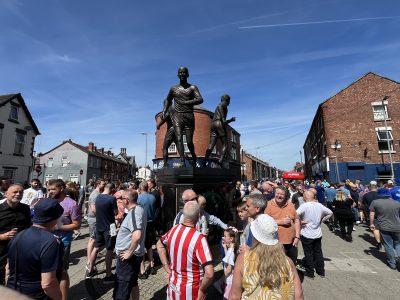
-
A blue Everton Fans house in the street near Goodison Park
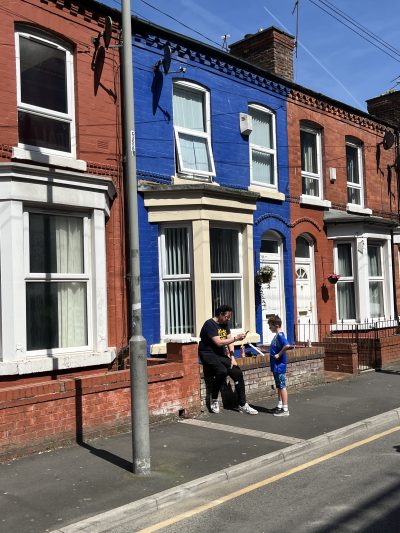
-
Fans walking towards Goodison Park
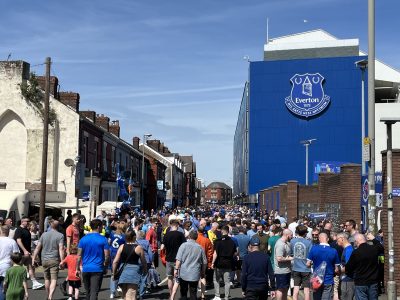
-
Two fans passing the statue of Dixie Dean, who scored 383 goals for Everton
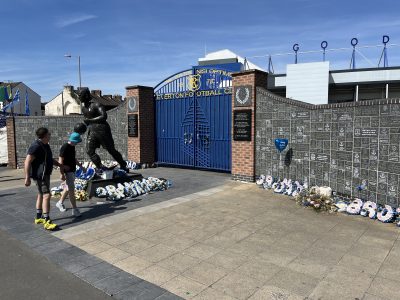
-
Fans around Goodison Park
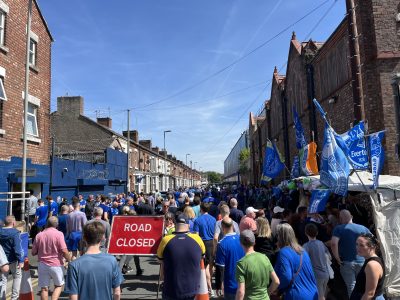
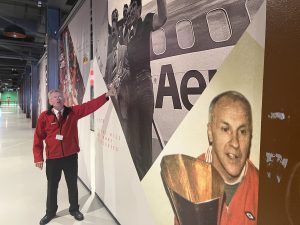
Anfield Road tour guide Andy during the stadium tour
Less then a mile away from Goodison Park lies Anfield, the stadium that houses Liverpool FC. ‘Anfield Road has been my home since I was ten years old and moved here from Glasgow,’ Anfield tour guide Andy explains in a thick Scottish accent, ‘you hear all those different languages in the stands, but once the game starts we all speak the same language, the love for Liverpool FC’.
Over the years, Liverpool FC suffered a lot of dramas. For instance the Heysel drama or the Hillsborough disaster. But for every drama there are multiple success stories. For Andy, this is what makes Liverpool such a beautiful club. ‘When we fall, we fall hard. But the important thing is to get back on your feet again. You do that together with the other fans next to you in the stadium or in the pub. And when we return at the top, we return as hard as we fell, with beautiful football and great players.’
* Toffee is the nickame for Everton fans, tracing back to Mother Noblett’s Toffee Shop which sold Everton themed Toffees
A Friendly Rivalry
’When doing the tour of Anfield, you can see Goodison Park from the windows. I always joke about not turning your head too far to the right and burning your eyes. But actually we need to thank Everton, because without them, Liverpool FC wouldn’t even exist,’ Andy explains.
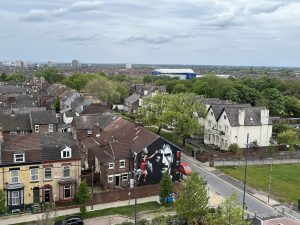
Goodison Park seen from the windows of Anfield Road
As Andy points out, Liverpool FC and Everton FC share a past. Everton was founded in 1878 and even played some seasons at Anfield, the stadium that now houses the Reds.** In 1892 Liverpool FC saw the light of day as members from Everton FC separated from the club and founded a new one.
Since then the clubs have played against each other al lot. This match has many nicknames like the Merseyside Derby, but even more famously the Friendly Derby. Jane explains why it’s called like that.
‘Many families in Liverpool have fans of both clubs in them. Mine as well, my husband is a Redfor instance, while the rest of the family supports Everton. With a lot of other clubs this would be a problem, fans would be at each others throats. In Liverpool this is not the case, Reds and Tofee’s coexist in families.’
** Red is the nickname for Liverpool FC fans, as they play in a red jersey
Andy can agree to this. ‘My son in law is a Toffee, but he is a lovely fellow. His two daughters are real Everton fans as well. Last week was one of their birthdays, I even bought her an Everton kit. It felt weird in the beginning, but you know family is more important than fandom.’
Even though fans of either club are friendly with each other, there still is a rivalry between Liverpool and Everton. It’s not all fun and games.
In the Oxford dictionary rivalry is explained as: ‘a situation in which people, businesses, etc. compete with each other for the same thing’. Sport rivalry goes even further than that. Cody T. Havard, writer of the book Rivalry in Sport, states among other things that sports fans can experience the same amount of joy when a rival team loses, as when their favourite team wins.
Andy can confirm: ‘When Everton got points deducted for financial misconduct, those were the best days of the season.’ Furthermore, Jane adds: ‘Liverpool started to lose many games at the end of the season, throwing their title chances away. This was met with almost bigger cheers than when Everton scored a goal.’
Although these two rivalling fans agree on a lot, and the clubs both come from the same city, there a still quite some differences between the two clubs. See the inequality in revenue, prizes, team worth and how the just finished season went for the FC’s in the graphs below.
The difference in revenue and worth of the teams have multiple reasons, net worth of the ownership for instance. Liverpool FC is owned by the Fenway Sports Group. This company also owns sports teams like the baseball team Boston Red Sox. The net worth of this company was estimated at $10,4 billion, by Forbes in 2023.
Everton FC is owned by Farhad Moshiri, a British-Iranian businessman. He first made his money as an accountant for companies like Deloitte and Ernst & Young and later in the mining industry. His net worth is estimated at $2,7 billion, by Forbes in 2024.
Another big difference between the clubs is commercial revenue. This kind of money comes from sponsorships and pre-season tours abroad for instance. Liverpool FC earned £272.5 million in commercial revenue according to its financial report of 2023. Everton FC earned £19.2 million, as stated in its financial report of 2023.
Clubs also make money with selling players. Looking at this form of income you can see a somewhat surprising difference. Liverpool FC gained a profit of £19.2 million, Everton FC gained a profit of £47.5 million.
How To Become A Fan
‘My father and his brother listened to the football matches on the radio, there were no TV’s back then. The first time they listened to it, the game was Arsenal versus Everton. My father then chose to be for Arsenal and my uncle chose Everton. My uncle then persuaded his kids and every niece, nephew to be a Toffee as well,’ Jane says
Family members play a key role in picking a sports team to support. In a study published in the Journal of Sport behaviour, the father is named as the primary influence in choosing a club to be a fan of.
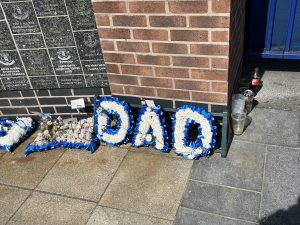
Bouquet next to the entrance of Goodison Park
‘My father took me to my very first game and I have been in love with Liverpool FC ever since. My dad was working a lot in those days, but we always went to Anfield together. This made me feel a lot closer to him actually,’ Andy tells.
Closeness is also a factor in becoming a fan. John Williams, associate professor in sociology at the University of Leicester and researcher of the sociology of football fan culture, names proximity to the stadium as one of the deciding factors.
Proximity is becoming less of a factor though, says Professor Peter Millward, a professor in Sociology and researcher of football fandom at Liverpool John Mores University.
‘Football is not just watched in the stadium anymore. The availability online, through social media but also through streaming made it so much more accessible. This dynamic also made it easier to become a fan oversees. Some people might live in Asia and be big fans of Liverpool FC or Everton FC without ever visiting the city.’
Football Fans and Local Identity
Once you are a fan, fandom can go quite far. Wanting your team to be the best is an elemental part of being a fan. Some fans take it even further and claim that the club is their life, like Andy and Jane also do. Professor Williams explains how this goes. ‘How does a working class man or woman achieve some dignity and worth in his or her life? By supporting a local football club, which can be imagined to be an extension of his own identity. We won! For many people in the 1980s in depressed cities like Liverpool, football success was vital to local self-esteem.’
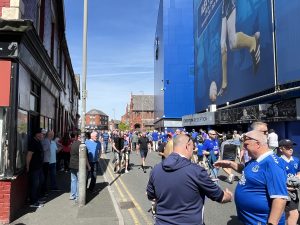
Fans meeting up before the Everton game near the stadium
Contributing to local self-esteem was important for people living in Liverpool. Liverpudlians have always felt different from other people in England. John Rookwood, sport management lecturer at the University of Dublin, wrote a chapter called ‘We’re not English, we are Scouse!’, and explains there why.
‘Liverpool looked west to Ireland and America for guidance and inspiration on identity issues more than it had to other English cities. Furthermore the media distorted, simplified, biased and reinforced stereotypes of Scouse*** identity a stigmatization which kept late twentieth century Liverpool apart as an internal ‘other’. However, with characteristic inverted pride, many Liverpudlians adopted rather than contested such crude stereotyping.’
Particularly during former Prime Minister Margaret Thatcher’s conservative governance, many amongst the local population came to feel a sense of alienation, increasingly defining their local Scouse identity against Englishness, Rookwood states.
*** An accent in the English language associated with Liverpool
Likewise, Everton FC fan Jane told that she is very proud to be a Liverpudlian. When asked if she will support England and the European Championships she said: ‘Why would I? I’m not English, I am Liverpudlian. Why would I support England when Everton FC is all I want to cheer for?’
The not being a part of England, is also a part of Liverpool FC fandom, was a conclusion from a focus group analysed by professor Peter Millward. When celebrating European success, the meaning was ‘to show clubs on the continent that Liverpool is not England.’
-
Pedestrians walking past a mural of Virgil van Dijk and Mohamed Salah, Liverpool FC stars
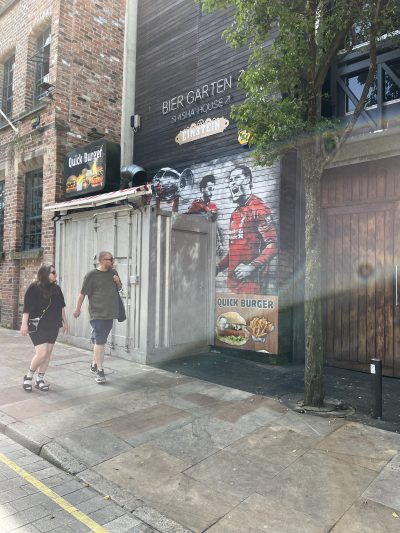
-
A fan looking through the fan shop of Liverpool FC
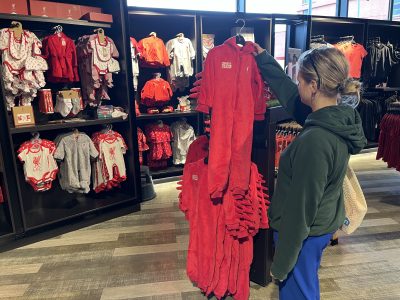
-
The Liverpool players touch this sign before a match for good luck
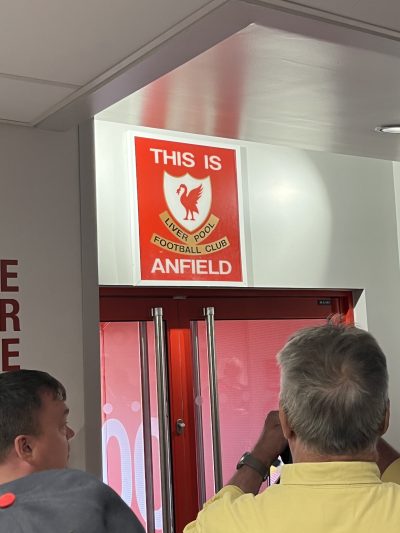
-
A mural of Jürgen Klopp, who has left Liverpool FC after ten years
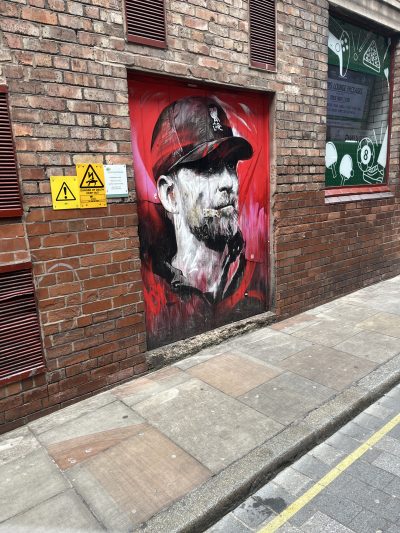
-
You'll Never Walk Alone is the signature song of Liverpool FC
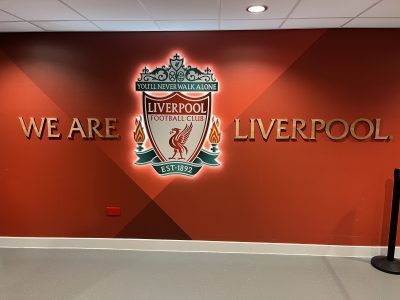
For Liverpudlians, their clubs are more than sports clubs, they are a part of their local identity. An identity they are proud of. This regional identity gives a football club a deeper meaning. Clubs like Liverpool FC and Everton FC can function like ‘tradition keepers’. According to Adriano Gómez-Bantel, contributor to the book Football, Community and Sustainability, these clubs can have a charismatic aura, in comparison to clubs that focus on financial power and act as an economic unit.
Professor Williams states that especially Everton FC plays such a role in Liverpool, as the club has a long and rich history, but has not won many prizes or attracts a lot of fans from abroad. Furthermore the fans feel connected to the players, as they come across with stubbornness and various un-respectable attitudes, like Liverpudlians also do.
That is why Jane called Everton FC the people’s club. ‘It is really the club of the people of Liverpool. Hard-working, stubborn, sometimes a bit rough. The tickets are not too expensive yet, the club has not been sold out to big money companies and sponsors. Everton is ours.’
